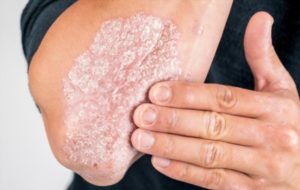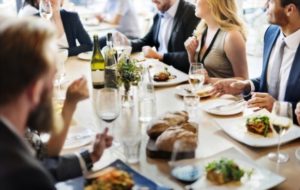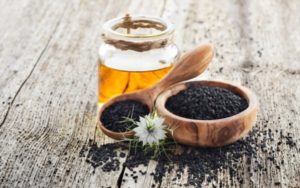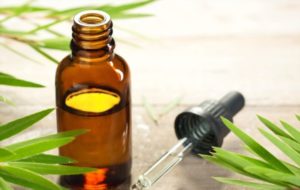What is psoriasis?
First you need to figure out what psoriasis is. Is it a skin disease? No. It is a chronic, non-infectious autoimmune disease that predominantly affects the skin. It is not contagious. This is a disease associated with a change in more than 50 genes, which entails shifts in the body’s processes and metabolism. The sooner these shifts are recognized, the faster and better they can be corrected. 
Psoriasis speeds up the cell life cycle. At the same time, it is not the skin itself that is “sick”, but the human immune system: the cells that are supposed to protect the body from harmful bacteria and microbes (T-lymphocytes) mistakenly attack healthy skin cells. In response to this attack, the body very quickly produces new skin cells that are layered on top of old ones. Bulging scaly patches appear on the skin that itch. Psoriatic plaques can be localised in different places: on the palms of the hand, on the soles of the feet, on the elbows, on the knees, on the lower back, on the scalp. In some, it may be small areas, while in others, this pathology affects large areas of the skin. In either case, psoriasis can disappear and appear again. Exacerbations can occur under the influence of various reasons. The following factors can become triggers (often all together):
- Disorders of carbohydrate metabolism (diabetes)
- Changes in cholesterol (this is associated with vascular damage)
- Inadequate defense reaction of the body (the body does not fight against bacteria and the diseases they cause, but against its own cells)
By changing your lifestyle, choosing a suitable diet, you can control the external manifestations of psoriasis, which in turn will help eliminate complications associated with a violation of the immune system and carbohydrate-fat metabolism.
How to live with psoriasis?
Can psoriasis be cured? No. Science has not yet found ways to change the human genetic code. The disappearance of plaques only means the suspension of the disease process. You have to learn to live with psoriasis. You need to choose the most suitable lifestyle, diet, exercise, skin care and the necessary treatment regimen.
Consider these factors:
- Diet. Check for digestive problems. Perhaps there is an allergy to food, intolerance to various substances, insufficient secretion of gastric juice, etc.
 There is a risk of diabetes. In this case, the food should not be too high in calories, alcohol should also be excluded, since it can provoke an exacerbation of psoriasis – this is especially true for beer, champagne and spirits. You should also exclude the use of products containing vinegar, pepper, chocolate, as they worsen the course of the disease.
There is a risk of diabetes. In this case, the food should not be too high in calories, alcohol should also be excluded, since it can provoke an exacerbation of psoriasis – this is especially true for beer, champagne and spirits. You should also exclude the use of products containing vinegar, pepper, chocolate, as they worsen the course of the disease. - Physical activity. Sports or physical activity can reduce the risk of heart problems. The rhythmic work of the heart contributes to lipid metabolism, the process of creating a lining of blood vessels. Studies have shown that athletic people get psoriasis much less often.

- Change of seasons. Depending on the seasonality, psoriasis is distinguished in winter, summer and indefinite. Winter psoriasis is most common. In the summer, under the influence of sunlight in such patients, the symptoms weaken or disappear altogether. On the other hand, people with summer psoriasis should avoid the sun, as it worsens the course of the disease.
- Skin care. In caring for the top layer of the skin, use the products prescribed by your doctor and follow the advice of a dermatologist. Although this does not always help.
Alternatively, natural oils and essential oils can be used to combat psoriatic plaques in the skin. The accolade among natural oils belongs to Black Seed oil. Not every person is familiar with this remedy for the treatment of psoriasis, to many it may seem unusual and strange, but let’s take a closer look at it.
 Black Seed oil
Black Seed oil
Much has been written about the miraculous properties of this oil. It is considered a unique remedy. Let us briefly recall that it contains more than 100 compounds: vitamins, macro- and microelements, fatty acids, amino acids, phenols, alcohols, ethers, phytosterols, carotenoids, phospholipids. It also contains over 50 catalysts for natural protein biosynthesis. Due to its unique chemical composition, it is useful in the treatment of various diseases: respiratory tract, internal organs and skin.
We will only touch on the effect of black seed oil on the treatment of psoriasis. The choice of this oil is due to the fact that, with its anti-inflammatory, antimicrobial and antibacterial properties, it helps to relieve inflammation, redness and flaking of the skin. It moisturises and nourishes the skin where the plaques are located. Helps fight bacteria, repair damaged skin structures and promote skin healing. As we wrote above, although psoriasis is never completely cured, the disease enters the stage of stable remission, the plaques decrease in size and in some cases become almost invisible.
The widespread use of this oil in cosmetology has proven that it significantly improves the condition of the skin. Therefore, it is increasingly used in complex therapy aimed at treating psoriasis. It helps to localise the ongoing inflammatory process and regenerate the skin.
How to use :
Treatment of psoriasis with Black Seed oil is carried out by applying it to affected areas of the skin 3 times a day using a cotton swab dipped in oil. For a faster and more lasting positive result, 1 teaspoon of black seed oil should be taken orally in the morning on an empty stomach.
Black Seed oil therapy should be performed 2-3 times a year.
Various mixtures and ointments are prepared with Black Seed oil. A mixture of Black Seed oil with Tea Tree essential oil has shown it works well in the fight against psoriasis.
 Tea Tree oil
Tea Tree oil
Possesses high antiseptic, antibacterial, anti-inflammatory and antiviral properties. It is used to eliminate skin irritations and in the treatment of acne and psoriasis. It is used in cosmetology, and is part of some shampoos designed to reduce psoriatic plaques on the scalp. A strong antifungal agent. When applied to the skin, it must be mixed with Black Seed oil in a ratio of 1:10 and applied to the affected skin with a cotton pad dipped in this solution. For scalp psoriasis, add a few drops of Tea Tree oil to your shampoo and let it sit for 10 minutes before rinsing.
Treating psoriasis in this way is beneficial for the body, because such manipulations do not cause any side effects and do not poison the body.
Psoriasis is not only a skin disease. The pathological condition develops in several directions and is associated with the immune system, and the symptoms of psoriasis are only a consequence of existing abnormalities. Therefore, for effective treatment, all provoking factors should be excluded, such as an unhealthy diet, bad habits, environmental influences and others. Despite the fact that psoriasis, like other autoimmune diseases, cannot be completely cured, a timely visit to a doctor and adherence to preventive measures will help stop the progression of the disease and maintain an acceptable quality of life.
